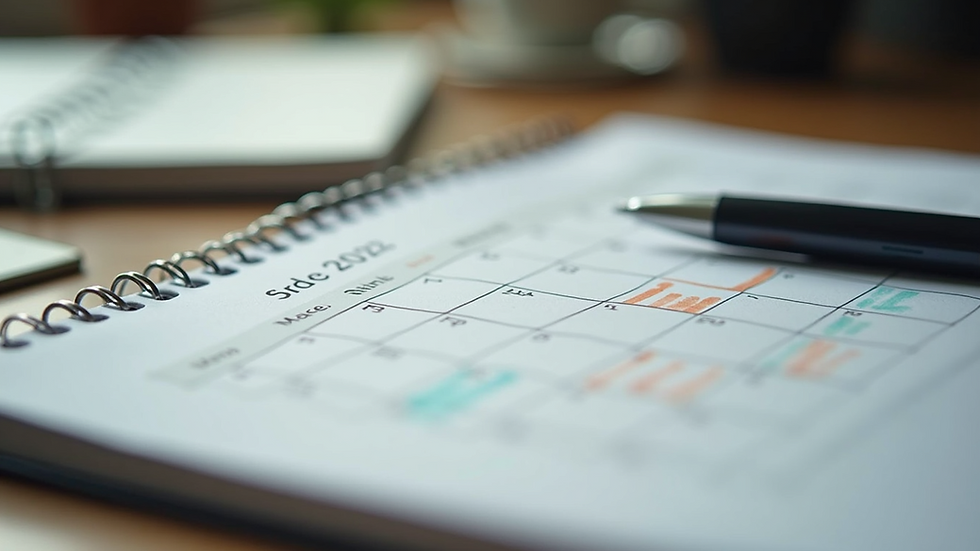Crafting an Effective Study Schedule for USMLE Exam Preparation
- jrandazz1
- May 13
- 4 min read
Updated: May 29
Preparing for the United States Medical Licensing Examination (USMLE): Strategies for Success
Preparing for the United States Medical Licensing Examination (USMLE) is a significant milestone for future doctors in the U.S. This journey can feel overwhelming. There’s a vast amount of material to cover, and the stakes are high. Creating a detailed study schedule is crucial. A solid schedule helps you learn efficiently while keeping your motivation high. In this post, we will explore how to craft a study schedule that maximizes your study efforts and sets you up for success on the USMLE.
Understanding the USMLE Structure
Before diving into your study schedule, it’s important to grasp how the USMLE is organized. The exam consists of three steps:
Step 1: This step concentrates on core medical science subjects. These include anatomy, biochemistry, microbiology, pathology, pharmacology, and behavioral sciences. Students often spend about 4-6 months preparing for this exam. Emphasizing high-yield topics like microbiology is crucial, as it comprises about 10% of the exam.
Step 2: This step has two parts. Step 2 Clinical Knowledge (CK) tests medical knowledge necessary for patient care. Step 2 Clinical Skills (CS) assesses your ability to interact with patients. Research shows that students who practice clinical scenarios regularly score, on average, 10% higher in this section.
Step 3: This step focuses on applying medical knowledge in a clinical environment. Many find this step the most integrative. It tests both knowledge and decision-making skills in real-life situations.
Understanding these components will shape your study plan and time allocation.
Setting Realistic Goals
After familiarizing yourself with the exam structure, it's time to set achievable study goals. Define clear objectives for your study sessions over specific timeframes. Break down your main objectives into smaller, manageable weekly and daily targets.
For example, aim to cover two primary subjects each week. You could also complete 50 practice questions a day. Your goals should align with the SMART criteria: Specific, Measurable, Achievable, Relevant, and Time-bound.
Choosing the Right Study Resources
Selecting the best study materials is key to effective preparation. Tailor your resources to fit your learning style. Here are some popular and highly regarded study aids:
First Aid for the USMLE series: Provides concise notes and summaries that are easy to understand and reference.
UWorld question bank: Renowned for its high-quality practice questions that mirror the actual exam format and difficulty. Studies indicate that students using UWorld score an average of 15% higher on their exams.
Amboss: Offers integrated learning tools and clinical reasoning support, making it easier to connect theory with practice.
Investing in the right materials enhances your study efficiency and improves information retention.
Creating a Study Calendar
Now that you have your goals and resources, it’s time to draw up your study calendar. Your calendar should detail:
Daily study sessions: Be mindful of your most productive hours. If you focus better in the morning, schedule your most challenging subjects during that time slot.
Subject focus days: Allocate specific blocks of time for different subjects based on your goals. For instance, you might dedicate Mondays to pathology and Thursdays to pharmacology.
Break and review days: Include regular breaks to avoid burnout. Establish routine review sessions. Research shows that spaced repetition significantly improves memory retention.
Incorporating Practice Questions
A critical aspect of your study schedule is integrating practice questions. Dedicate time each week to tackle practice questions. This will familiarize you with the exam format and sharpen your critical thinking skills.
When reviewing answers, always look at the explanations for both correct and incorrect choices. This approach deepens your understanding and clarifies recurring mistakes.
Monitoring Progress
To ensure you stay on track, regularly check your progress. At the close of each week, assess whether you've met your goals. Identify any areas needing extra attention. For instance, if you notice a weakness in biochemistry, reallocate time from other subjects to bolster your understanding.
Being flexible and adjusting your schedule helps maintain momentum.
Staying Motivated
Preparing for the USMLE can be intense. Staying motivated is crucial. Here are effective strategies:
Study with a partner: Collaborating with someone else keeps you accountable. It provides opportunities for discussion, which can enhance understanding.
Use active learning techniques: Create flashcards, explain concepts to a friend, or join a study group to reinforce your learning.
Cultivate a positive mindset: Balance your study time with personal activities like exercise. Engage in relaxation and social engagements. These activities can enhance your overall well-being and help alleviate stress.

Preparing for Test Day
As you approach the examination date, adjust your study schedule to mimic test conditions. Schedule full-length practice exams to build stamina. Improving your time management skills is essential.
In the final week, focus on reviewing high-yield topics. Practice relaxation techniques like deep breathing or visualization to reduce anxiety. Gather all necessary materials for test day, including identification and directions to the test center.
Conclusion
Creating an effective study schedule for the USMLE requires diligence, planning, and flexibility. By understanding the exam’s structure, defining realistic objectives, selecting the right resources, and incorporating regular practice, you’ll be better positioned for success. Stay adaptable, evaluate your progress regularly, and prioritize your well-being.
While this preparation journey may be long and challenging, the right approach will help you navigate it effectively. Achieve your ultimate goal of becoming a licensed physician in the United States.
Best of luck on your USMLE journey!


Comments